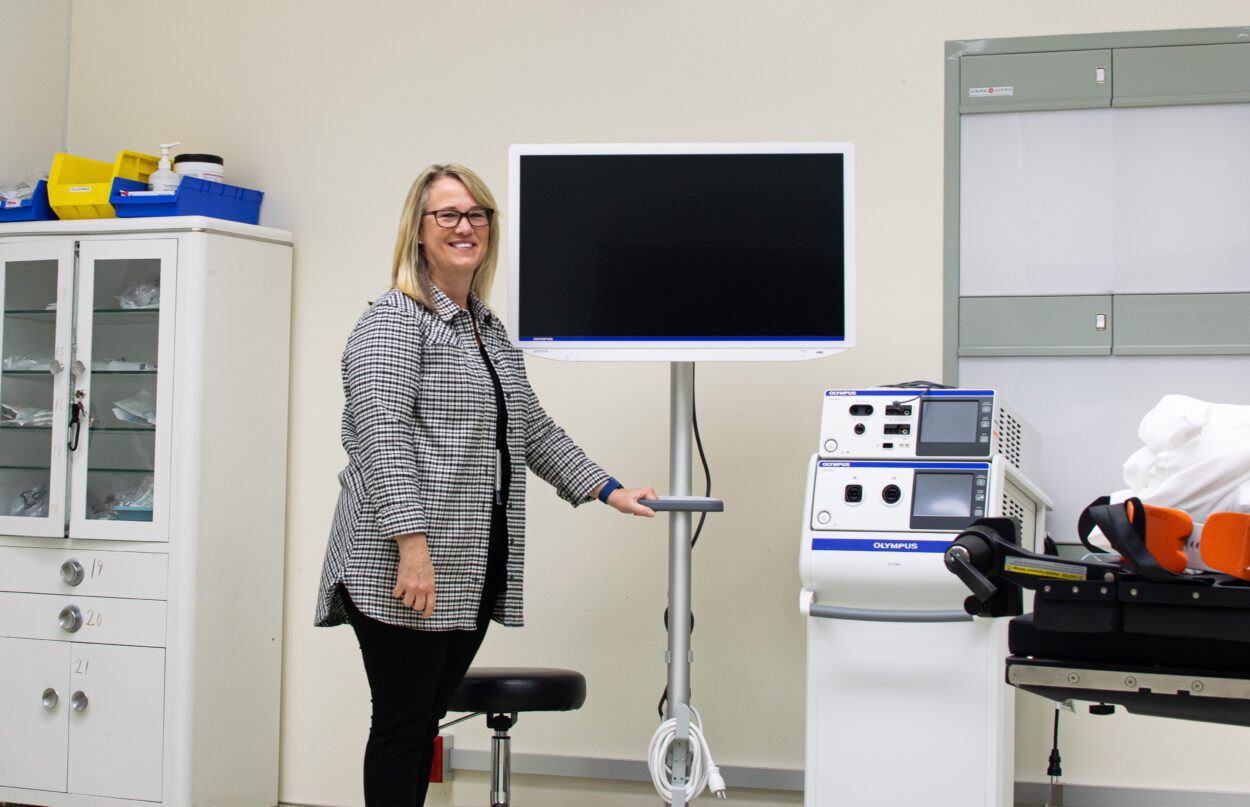
Petersburg’s medical center has brought back colonoscopy services after a five-year pause. Many residents are excited — and relieved — that they won’t have to travel far away from home to prepare for and recover from the exam.
Jennifer Bryner is the chief nursing officer at Petersburg’s hospital. She gave KFSK the grand tour of all the brand new equipment in the colonoscopy room.
Petersburg resident Chris Morrison was at the front of the line for the inaugural clinic. He said he was number two, though Bryner couldn’t confirm if that’s true — but she said it was certainly possible.
Morrison actually did wake up during the procedure — his very first colonoscopy. He said it was weird, but that he was in a “happy” place.
“I woke up through part of it, but I was happy,” said Morrison. “They were very professional — the gals did a great job.”
Morrison is even happier about his results — he’s in good health.
Chris’ wife, also named Cris Morrison, is the president of Petersburg Indian Association, the local tribe. Her first colonoscopy experience wasn’t so peaceful — or routine. In January of 2018, she was diagnosed with stage two colon cancer. Morrison was 58 at the time of her diagnosis, and by that time, she was long overdue for her first exam.
“When I was in my 40s, I remember a coworker who was ten years older than I was going through the process here in Petersburg,” said Morrison. “I did not want to talk about it with her, because it, frankly, seemed kind of gross. So I didn’t think about it. So, I did not have a colonoscopy at the age of 50, as was the recommendation. [Then] I was diagnosed with stage two colon cancer. Had I had a colonoscopy at the recommended age eight years earlier, that might have been prevented.”
She was medevaced to Anchorage for complications, and because Alaska Native Medical Center is in charge of her care. Though she’s grateful for the care she received there, she said it would’ve been nice to be able to recover at home, rather than in a hotel, away from family.
Petersburg residents haven’t been able to get colonoscopies in town since 2018. PMC’s visiting colonoscopy specialist, Dr. Eric Garcia, was killed by his friend and romantic partner the year before, in 2017. His killer was found guilty of first- and second-degree murder in June of this year. Someone stepped in for him to perform that service for a short period of time, but Bryner said Garcia’s death is what initially halted services, and that her team is still mourning the loss of their colleague.
“Dr. Garcia was the most wonderful man you could meet, and an excellent surgeon,” said Bryner. “We worked with him for probably eight or nine years and just loved him. I’ll never forget the day I got a call from Ketchikan saying that he had been murdered. So, that put a pause on things, but Dr. David Miller from Juneau was kind enough — he said he heard about it, and said he said he would step in for a year.”
After Miller’s term was up, the COVID-19 pandemic hit, which derailed PMC’s efforts to fully restart the service.
Now that scoping is back on track, Morrison wants to use her voice as a local leader to encourage more public awareness about early detection and de-stigmatize the exam.
“I shared some of my experiences,” said Morrison. “There were a couple of uncomfortable looks on people’s faces, initially. But the more I spoke about it, and didn’t shy away from the topic, the more relaxed they seemed to be about it.”
Alaska Native people get more colorectal cancer than other ethnicities. A worldwide study showed that Indigenous Alaskans had the highest documented rate in the world in 2018.
Bryner said Petersburg’s chemotherapy unit sees a lot of colorectal cancer cases.
“It’s one of those topics that people are kind of shy away from talking about sometimes,” said Bryner, “but it’s certainly one of the most prevalent cancers that we have seen for people doing chemotherapy and treatment for cancer in Petersburg. And it’s definitely one of the top three cancers that we’re seeing nationwide.”
She said she’s sympathetic to people who are hesitant to get checked out — prep is the worst part. Patients can only drink clear fluids for two days before the procedure to flush out their whole colon — that’s so the surgeon can have a good view of any abnormalities.
“But that’s the worst part,” said Bryner, “because they’re pretty much on the toilet for several hours at night. So that’s absolutely the worst part — and then being hungry! But once people get here, they’re like, ‘Oh, that was no problem at all!'”
She said a lot of her patients find it vastly more comfortable to prepare for the exam at home, rather than in an unfamiliar place far away, like a hotel. And around town, the hype for colonoscopies is growing — PMC had 18 patients at their first clinic, which is a lot more than they usually see.
“Our anticipation is that for the next clinic, we’ll do 21 patients,” said Bryner. “Unfortunately, we have about two full clinics already on our waitlist. But if people are interested, they should notify their primary care provider and they can at least get them on our list.”
The latest guidelines for colorectal cancer prevention say that everyone should get screened after the age of 45 — or earlier, if you have a family history.











